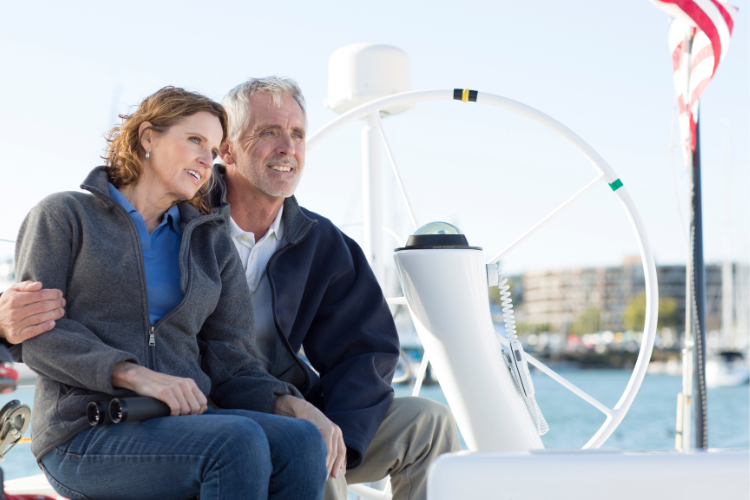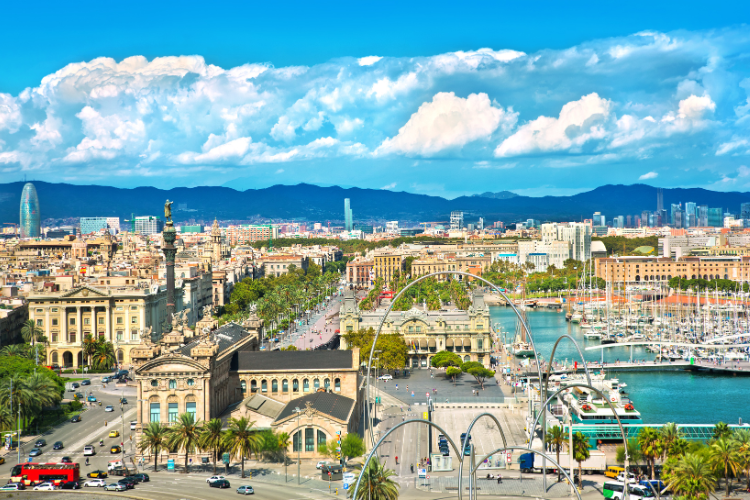Last Updated on October 29, 2025 by Maryam Siddiqui
Slowly but steadily, Spain has risen to become one of the most desirable countries in Europe to live under the golden sun. Known for its rich history, vibrant culture, and exceptional quality of life, it continues to attract expats from all corners of the world.
How does one live in Spain without working? Other countries often call the “Retirement Visa” the Spain Non-Lucrative Visa, which allows you to live in Spain with passive income!

This visa is ideal for retirees and individuals with sufficient financial means to support themselves and their families. If it’s your first time relocating to a new country, it’s natural to have questions about the process. Will this Visa suit my needs? Will I meet the eligibility requirements? Can I obtain a work permit with this Visa?
If you’re seeking answers to these questions, this post is tailored for you. It aims to address all sorts of queries expats ask. Tag along to find out more!
What is the Spanish Non-Lucrative Visa?
The Spanish Non-Lucrative Visa is intended for non-EU residents who wish to reside in Spain without pursuing professional activities for financial gain.
This Visa permits individuals to reside in Spain initially for one year, with the option to renew annually. This type of Visa is often called the visado de residencia no lucrativa. Or retirement visa because it is quite common among retirees.
What sets the Non-Lucrative Visa apart from other types is that it does not allow you to work while residing in Spain. Because of this restriction, applicants must demonstrate sufficient financial means to support themselves throughout their stay.
A key benefit of this Visa is that you can stay legally in Spain and travel within the Schengen zone. Compared to the other alternative, the Golden Visa, the Spain non-lucrative visa is an easier option since you don’t have to invest.
Remember that after living in Spain for five years, you can apply for permanent residence, which is valid for 5 years. As a permanent resident, you can enjoy the State’s healthcare system, travel discounts, and other benefits available to Spanish citizens.
Eligibility Criteria
The Spain Non-Lucrative Visa is designed for non-EU, EEA, and Swiss citizens who wish to reside in Spain without undertaking any form of employment or professional activity. The key requirement for this visa is proving that you have sufficient financial resources to support yourself during your stay.
If you meet this requirement and are still determining if this Visa would be perfect for you, here is how you would know:
- If you want to retire permanently to Spain;
- If you wish to initially stay in Spain to explore its cities and then switch to a different residence permit. For example, a work permit upon finding a job;
- If you wish to reside in Spain for 6 months to 1 year. And have sufficient savings to support yourself without seeking employment.
Applying for this visa is relatively straightforward. You simply need to demonstrate that you have the financial means to support yourself and any dependents accompanying you during your stay. With that in mind, let’s take a closer look at the specific documentation requirements.
Documents Required
Similar to when applying for any other visa in Spain, you must submit a few documents when applying for this one. Here’s a quick rundown.
- Correctly filled national visa application form.
- A Passport: You must submit a valid passport (valid for one year).
- Two passport-size photos were taken according to the Schengen requirements.
- Proof of sufficient means of subsistence: You can show proof of sufficient financial income by producing the following:
- Bank statements for the past three months. It is also worth mentioning that, as of 2025, financial documentation requirements have become more detailed; banks may now need to provide certificates with full account details, historical balances, and account-opening dates.
- Proof of investments.
- Evidence of passive income earning, for instance, rental investments. As of 2025, if you’re applying for the Spanish Non‑Lucrative Visa (NLV), you’ll need to prove annual passive income of €28,800 (that’s based on 400 % of the IPREM index).
- Medical certificate indicating that you are of sound health.
- Private health insurance: A certified copy of the document proving you have public or private health insurance from an authorized insurance provider in Spain is required. The insurance policy must cover all the risks in Spain’s public health system.
- Criminal record check certificate: This certificate should be from the last five years. Note that this is only applicable to adults.
- NIE number: Every foreigner intending to stay in Spain for over six months is assigned a unique personal identification number.
- Proof of relation if you are applying for a dependant.
Spain Non-Lucrative Visa Process
First and foremost, the application has to start from your country of residence. This means you must physically present yourself to the nearest Spanish consulate. If you currently hold a student visa and wish to switch to the Spain Non-Lucrative Visa, you’ll need to return to your home country to begin the application process.
Here is what the visa application process looks like:
- Apply for the Visa at least five weeks before your travel date;
- Schedule an appointment at the nearest consulate;
- Submit all the necessary documents;
- Attend the visa interview appointment with all the original documents;
- Pay the visa fee;
- Collect your Visa.
Upon arrival in Spain, register at the town hall for your certificado y volante de empadronamiento and apply for your Foreigner Identity Card at the police station.

Taxes for Spain Non-Lucrative Visa Holders
Navigating Spain’s tax system can feel a bit tricky at first, especially since the rules vary depending on your visa type. For Non-Lucrative Visa holders, one key thing to remember is the 183-day rule.
To renew your visa, you must have lived in Spain for at least 183 days in the previous year. This automatically makes you a Spanish tax resident.
In practice, this means that even though you’re not allowed to work in Spain under this visa, you’re still obligated to declare and pay taxes on your worldwide income, including earnings from pensions, investments, or property abroad.
The upside is that Spain has tax treaties with many countries to prevent double taxation, ensuring you’re not taxed twice on the same income.
Income tax rates in Spain range from 9.5% to 22.5%, depending on the autonomous community where you reside. If you plan to invest or buy property in Spain, you should be ready for possible taxes associated with these transactions.
Let’s Move to Europe
With Viv Europe your plans for Europe will come to a reality
Can I get a work permit?
If you find yourself unable to sustain yourself financially on the non-lucrative residence permit due to unforeseen circumstances, can you apply for a work permit?
Well, the answer to this question is yes. However, you can only apply for a work permit after obtaining your non-lucrative visa in Spain. In other words, you cannot hold both visas simultaneously. After completing your first year of residence, you may apply to switch from a non-lucrative visa to another type of residence visa that allows you to work legally in Spain.
However, you need to secure work before switching to the new residence permit that allows you to work. You must have an employment pre-contract and the appropriate work qualification.
Can I renew a Spain Non-Lucrative Visa?
Yes, you can renew a Spain Non-Lucrative Visa. The initial Visa is valid for one year, after which it can be renewed annually as long as you continue to meet the eligibility criteria.
Renewal requires submitting updated documentation, such as proof of sufficient financial means, valid health insurance, and a clean criminal record.
Unlike your initial application, this time you’ll need to submit all the required documents and complete the process within Spain. Be sure to start the renewal well before your visa expires to prevent any interruption in your legal residency status.
Can I invest on a Spain Non-Lucrative Visa?
Yes, you can invest in Spain on a Non-Lucrative Visa, but there are limitations on the type of investment activities you can engage in. The Non-Lucrative Visa is primarily for individuals with sufficient financial means to support themselves without needing employment in Spain.
While on a Spain Non-Lucrative Visa, you cannot engage in certain investments that are considered gainful activities or employment. These typically include:
- Employment: You cannot take up any form of employment or work for an employer based in Spain.
- Entrepreneurial Activities: You must refrain from starting a business or engaging in entrepreneurial activities that generate income in Spain.
- Professional Activities: You cannot provide services that generate income, such as consulting, freelancing, or any other professional activity.
- Commercial Activities: You cannot engage in commercial activities for profit, such as buying and selling goods or services.
Under the Non-Lucrative Visa in Spain, you are allowed to engage in passive income activities such as real estate ownership, financial investments, or pension funds, among others.
Can I retire on a Non-Lucrative Visa?
Yes, you can retire on a Non-Lucrative Visa in Spain. The Non-Lucrative Visa might be suitable for you only if you have sufficient financial means to support yourself without needing employment in Spain.
Many retirees opt for this visa to enjoy Spain’s exceptional quality of life, pleasant climate, and rich cultural heritage. As noted earlier, applicants must provide proof of a stable and regular income sufficient to cover their living expenses while residing in Spain.
- Read Also: Christmas In Spain: How Is It Celebrated?

Spain Retirement Visa
Beyond its pleasant weather and natural beauty, many expats are drawn to Spain for its attractive retirement options. While Spain does not have a specific ‘retirement visa,’ retirees typically choose between two main residency routes, the Non-Lucrative Visa and the Golden Visa, both of which provide an excellent pathway to enjoying retirement in Spain.
However, it’s important to note that as of 2025, Spain’s Golden Visa program is being phased out. This means new applications for the investment-based residence permit are no longer being accepted. Existing Golden Visa holders will continue to maintain their residence rights as long as they meet the program’s original conditions.
- Read Also: Types Of Visas For Spain: All Options For Expats.
Documents Required
The earlier part of this post already covers the documents required for the Non-Lucrative Visa, which remains the go-to option for retirees.
Previously, the Golden Visa required additional documentation related to the applicant’s investments. Although this route is now closed to new applicants, it’s worth understanding what it entailed, especially since many long-term expats in Spain first entered through this program.
Here were the types of investments that qualified for the Golden Visa before its phase-out:
- Real Estate Investment: Purchasing property in Spain with a minimum value of €500,000.
- Capital Investment: Investing at least €1 million in Spanish stocks, bonds, investment funds, bank deposits. Or €2 million in Spanish public debt securities.
- Business Investment: Starting a business venture in Spain that creates job opportunities, contributes to scientific or technological innovation, or has a significant economic impact.
Difference between a Non-Lucrative Visa and a Spain Golden Visa
The Non-Lucrative Visa and the Golden Visa were both pathways to residency in Spain, but they served very different purposes.
- Non-Lucrative Visa: This visa is designed for individuals who wish to live in Spain without working or running a business. It remains the main option for retirees and others who have sufficient passive income to support themselves. The visa is typically valid for one year and can be renewed (with evidence of at least €28,800/year for 2025).
- Spain’s Golden Visa (Now Phased Out): This was a residency-by-investment program that allowed non-EU/EEA/Swiss citizens to gain residency by investing in real estate or other assets. It provided more flexibility; holders could work, bring family members, and travel freely across the Schengen Zone. Again, although the program has been discontinued, existing holders can still renew their permits under the original terms, but new investors can no longer apply.
Do you want to move to Spain?
Relocation never has to be confusing, especially if you’ve chosen Spain as your destination. You don’t want to deal with bureaucracy at this point in your life.
Allow Viv Europe to handle all your needs and make this process simpler and faster. Contact us today and get help with everything from applying for the Spain non-lucrative visa to finding your new home.
But you don’t have to take our word for it! Be sure to check out our Facebook Group – All About Spain For Expats, and chat with others. We can tell you’re ready to change your life forever!





